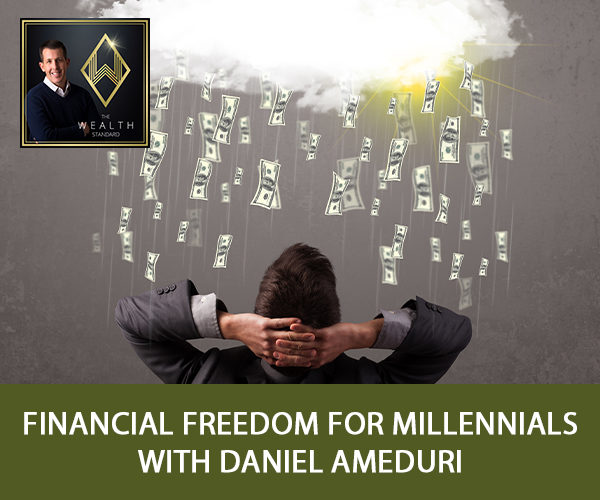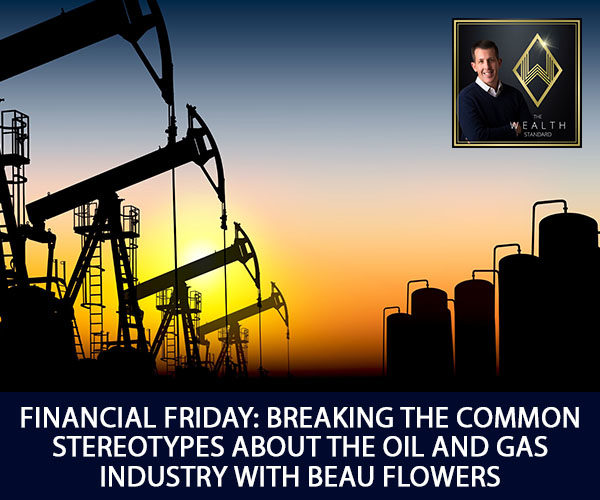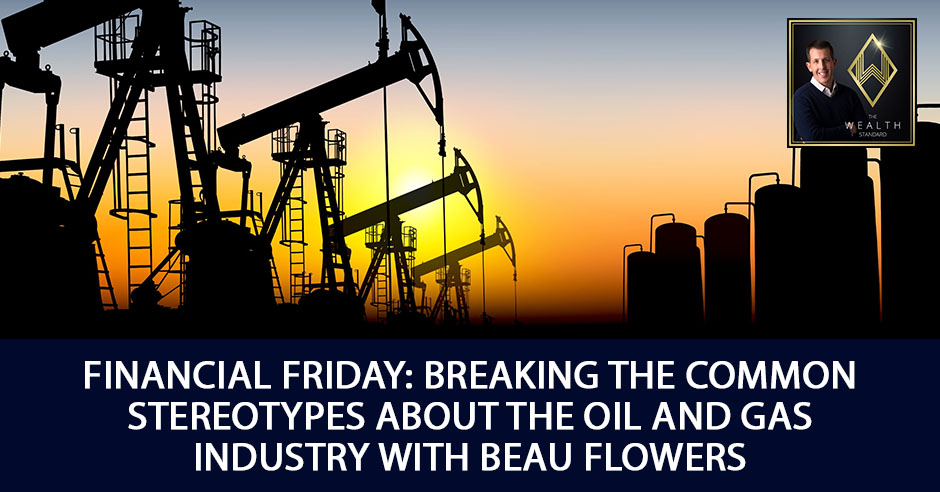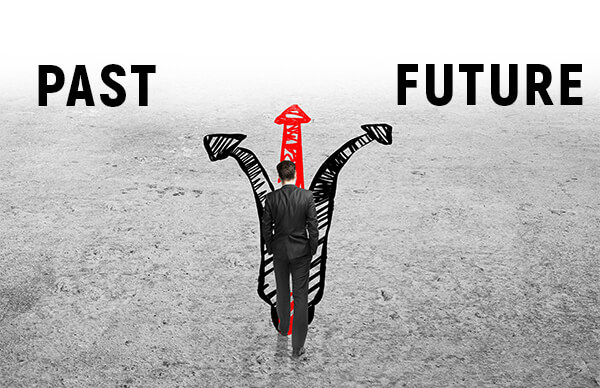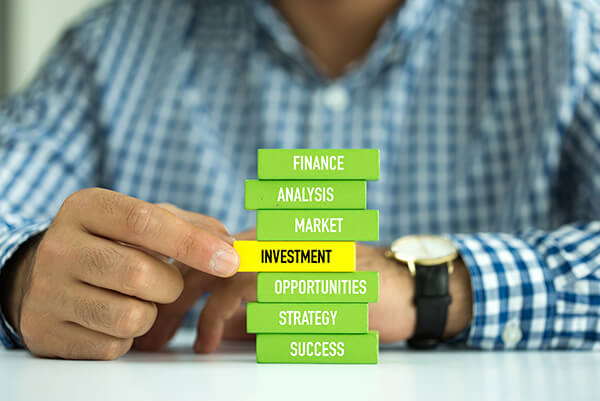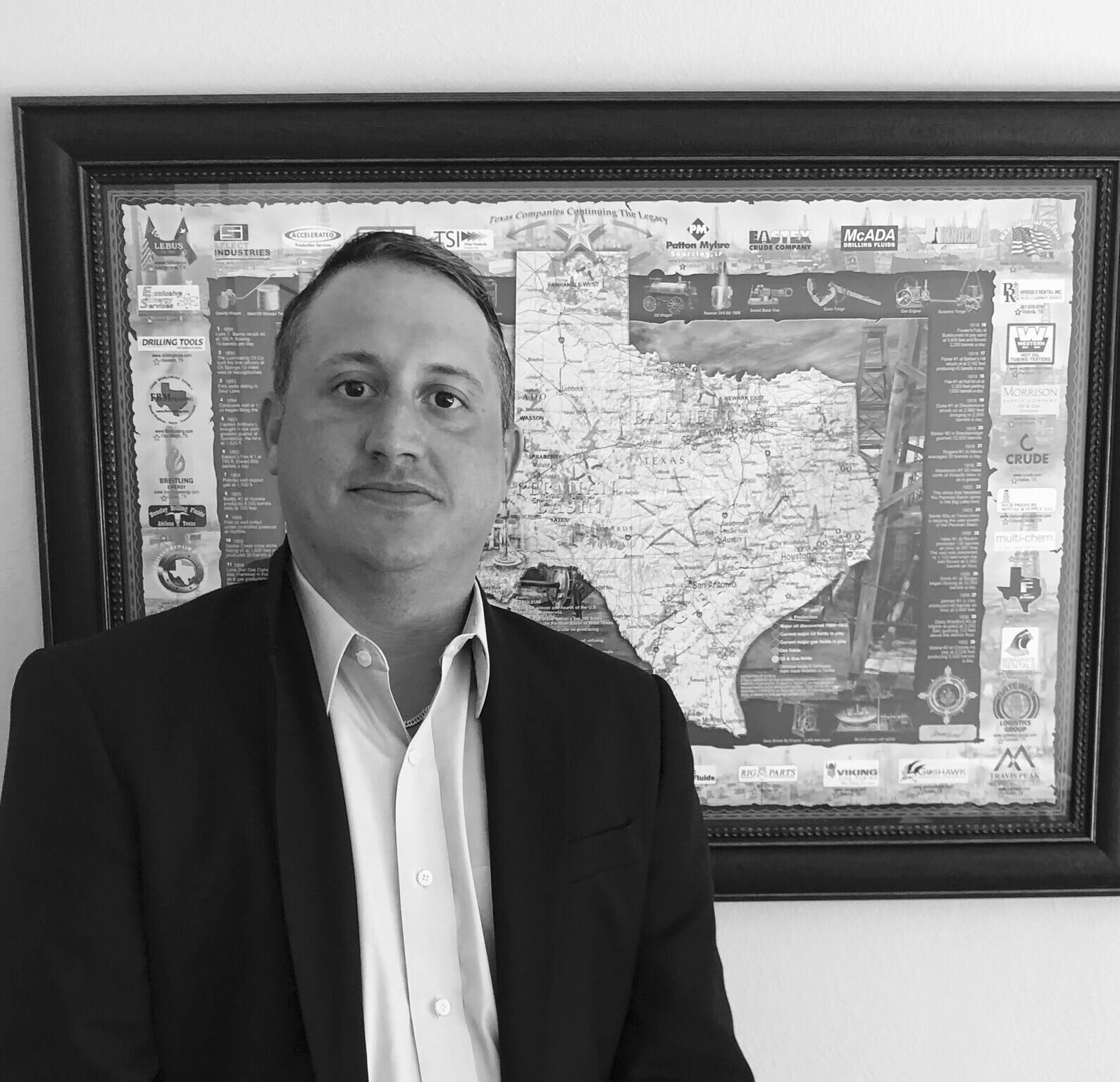Financial Freedom For Millennials with Daniel Ameduri
Podcast: Play in new window | Download

The road to financial freedom has always been dictated by financial norms, a lot of which don’t really seem like freedom at all. Editor and the Founder of Future Money Trends, Daniel Ameduri, talks about financial freedom and what it looks like for the Millennials. Walking us through the concepts of his book, Don’t Save for Retirement: A Millennial’s Guide to Financial Freedom, Daniel notes that the Baby Boomer generation has inculcated in most Millennials the idea of saving for their retirement and putting their money on retirement funds which has given the younger generation more pressure. Breaking the shackles that are forcing us to commit to that tradition, Dan teaches Millennials how to deviate efficiently from investment and embrace the gifts brought by their time.
—
Watch the episode here:
Listen to the podcast here:
Financial Freedom For Millennials with Daniel Ameduri
On this episode, I have my good friend. He’s become a great friend, but he’s also the Editor and Founder of Future Money Trends, which is a publication business. He has come out with a book, Don’t Save for Retirement: A Millennial’s Guide to Financial Freedom. I know he has been working on this for a while. I had him on the show many years ago. Daniel has been front-running the cryptocurrency, the cannabis, the precious metals and other alternative investment world for quite some time on his YouTube channel and very popular website, FutureMoneyTrends.com. You are going to get to love his perspective on life and I think you’re going to get a lot out of reading his book and hearing the story firsthand. Daniel is an amazing writer and entrepreneur. If you’re reading about him for the first time, then it is going to be a treat. Without further ado, welcome, Daniel Ameduri.
—
Daniel, thank you for spending the time, it’s awesome having you back on. You were on several months ago. It’s a pleasure and I’m super excited about your book.
Thank you for having me on. I should let the audience know that I have seventeen policies, dividend-paying, cashflowing, gushing, safe. I’m dual compounding them too, but I’m sure we don’t want to go down that rabbit hole but they need to learn from Paradigm Life for that.
There are many things you can do as a Millennial if you embrace all the gifts and the things that the world has given us. Share on XDaniel, I’ve gotten to know you over the years and you’ve done some incredible work. It was awesome to hear more about your story. I never got into that with you even though we’ve had some discussions over the years. Your book is well-written and I like how it opens up your life. How people come to this opinion or perspective of life, there’s a backstory to it. Without that backstory, sometimes it’s hard to buy into a person’s perspective, especially if it’s different than the status quo. Looking at the title of your book, it’s totally against what most people believe. Telling your story and opening yourself up that way awesome. Would you mind maybe talking through what was the book about? What was the purpose of it? What message do you want to send? Who is it intended for? Maybe start there.
The book is called Don’t Save for Retirement. For your audience, we’ve set up a special page at FutureMoneyTrends.com/save. They can read the intro in the first chapter. If they like it, they can buy it. There’s a link. This book started when I was in an attorney’s office setting up my trust, my will and I turned to my wife like, “We know where the kids are going to go. We know where the money’s going to go. What about teaching the kids? What if they get this bad conventional wisdom conditioned into them without mom and dad there who is a fairly strong presence and force against that stuff.” We started brainstorming what we could do. I was like, “How about we write a book? It will be great for the business. It will be great for other people who can read it.” It started with no initial audience in the sense that it was teaching my children, but also keeping in mind Millennials and other people who might be saving the conventional means of retirement and what they could do with their money.
I wanted to bring in what my wife and I did because I didn’t want people to think that, “This guy has got an economic sense on his shoulders and all this stuff.” The intro starts in a bankruptcy attorney’s office. We were messed up after 2008. I got a job making $10 an hour. My wife was a school teacher. We were about to have a baby. Things were wrecked. That’s where the book starts. It starts off how I dug myself out, what it took not just financially, but a change in my mindset and my change in what is even acceptable. The book, Don’t Save for Retirement, I would say almost is a cross between my personal story and personal finance. That’s an alternative way.
It’s not Robert Kiyosaki where it’s all getting leverage. It’s definitely not Dave Ramsey where it’s like, “No debt.” It’s like, “This was my story. This is how I did it. This is all the things I learned along the way.” One thing that rings true with what I’ve learned from Robert Kiyosaki is the poor and middle-class speculate, they just do, no matter what they’re in. Their retirement vehicles, they’re always speculating. The rich preserve and focus on income, which is one of the reasons why I’m so attracted to your company, Paradigm Life, that preservation and income mindset. The advantage of the rich is they’re already rich. However, I learned that if the middle class apply those same principles, they can also be very wealthy.
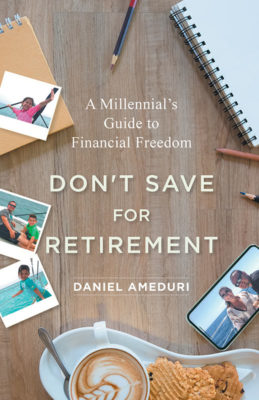
Don’t Save for Retirement: A Millennial’s Guide to Financial Freedom
You use some very strategic words in the book. The one that comes to mind is the idea of control and I thought a lot lately about group psychology, a group narrative. I look at our school system. I look at the workplace. I think it’s programmed into our mind the being told what to do mentality, “You’ve got to do this. I am superior, therefore do what I say.” These days, people are speculating, but they’re not even thinking. They’re doing what everybody else is doing and they’re assuming that whoever’s telling them to do it is going to give them the results that they want, which of course there are many different examples of that not being the case. It was cool as taking control and using your mind to figure out what you want financially is where it starts. Unfortunately, there are these traumatic events, difficult events that cause us to have those paradigm shifts. When you’re writing the book specifically for your kids, if they read the book, what did you want them to get? What was that message? They close the 196-page and it’s like, “What is that next thought?”
That they choose their destiny, that there is no right way or wrong way. Whether they have a job and become great passive income investors or they have a business and they’re investors as well or they’re a stay-at-home-mom or a stay-at-home-dad. I don’t care what they do. I want them to know that they can do whatever they want to do. It is their life and many of us, exactly in line with your question, do what everyone else does and follow the crowd. Everyone else is going to college. Everyone else is saving for retirement. Everyone else is financing their house for a few decades. Everyone else is financing their cars for a few years. Everyone else is buying term because your whole life’s a scheme.
It’s nonstop no critical thinking and I want them to let them know like, “You can do whatever you want and if you want freedom, you have to buy your freedom. It’s not going to be free. It will require sacrifice and it will require good decision-making that will compound. You’re not going to be eighteen and financially-free, but you could be 25 to 40 years old and be financially free as opposed to the alternative plan which is, ‘Give all your money to Wall Street and we promise you in 30 to 40 years, even though you have no idea what your tax withdrawal rate will be or what the funds will even be at, you’ll be able to retire at this magic number that some German politician wanted to win an election.’ He upped the other guy by instead of running on 70, he said 65.” I want people to know that ultimately you choose your destiny and a lot of us have to be woken up and slapped in the face like, “What are you doing? You’re on autopilot.”
I’d love to hear your opinion on what are the events that would cause a person to read this information and not necessarily have it discarded but actually implemented and used. We’re in this period of time where debt is an all-time high, student loan debt, consumer debt. If you look at household income, it’s been stagnant for many decades. You look at people who are not getting ahead and I know that there’s frustration. There are polls. There are headlines that come out all the time about the frustration that exists in America with people not growing, not getting ahead, which essentially is the anti-life because people are naturally compelled to grow. Where do you think the pain threshold is until people snap out of it?
I hope their pain threshold is not bankruptcy or like me, where I was in a bankruptcy attorney’s office with my wife crying. I certainly hope their pain threshold doesn’t go to a point where they get so angry at their job that maybe they do something that gets them fired or damages their resume for the future. Ultimately, that frustration Americans are feeling is because they have subscribed to a middle-class lifestyle that is not sustainable. Much like the national story of what our government is doing, our citizens are doing. I can’t fix the government, but we can all fix ourselves by making some changes in our own lives. In the book, I talk about what my wife and I did. We drastically cut spending.
Did we do it forever? No, but we did it for a year-and-a-half, two years. Even when we weren’t drastically in cutting spending mode, we still live very frugally. I always tell people it took many years. When I achieved that financial independence, net worth millionaire status, not even liquid, but net worth. I was driving a 2003 Nissan Altima. It was a ten-year-old car. I was living in a house, at the time when I purchased it, it was about one time our annual income. By the time I was financially independent, the thing was one-third of our annual income, but I was still doing that and not permanent. Now, I live in a very nice house and I get to enjoy all the luxuries of those sacrifices that I made.
If you want freedom, you have to buy your freedom. It's not going to be free. It will require sacrifice and good decision-making. Share on XYou have to, at some point in time, say stop. For most of us, unfortunately, we’ve subscribed to the unsustainable lifestyle. You might have a car that’s equal to your annual income spread out over a few years. You might have a house that’s ten times your annual income. You might have done a lot of things that have messed you up. That’s where I love the Dave Ramsey personal finance part like, “Start the cutting spending.” Stop doing all this stupid stuff that’s excessive. What I like to do is after I cut the spending is shift the savings of the spending into buying income and training that brain that everything I buy, I want to see a check either quarterly, annually, monthly. I want money coming in from everything I do. One of the things I have in my house in the children’s schoolroom is only to buy assets that cashflow.
We’re all going to get involved with speculation. I’m the worst. I love microcap investing and venture capitalism, especially here in California. Ultimately, 90% of my efforts and my focus is focused on buying income. Anyone who’s frustrated and who is in that lifestyle of trying to keep up with the Joneses realizes that financing everything in your life and spending every last bit of your paycheck, it is not normal. It may be perceived as normal because that’s what everybody else was doing, but it’s not. You have to say no. If you’re reading and that resonates with you, it can be done. It’s going to take a few years to mop this thing up, but you can be financially independent and either quit your job or work part-time or full-time because you love what you do.
These are all amazing points. In the book, what direction are you giving to people? What are the steps that they can take? Starting with whomever that person you were writing to when you were typing out the words of the book and getting them to take that first step then the next step. What are some steps that people can take to go from where they’re at and start to circumvent better or build a bridge over the gap to where they want to be?
The first chapter starts with, “What is wealth?” A lot of people don’t even know what they want. They’re just going through the motions of life. They’re killing time while they’re here on earth, which is very sad. For me, wealth is the ability to be able to do what I want with my time, to wake up when I’m done sleeping, to be free. I think that’s the first step is defining what you want. I always tell people, I learned this from James Altucher. He talked about the three things you want people to say at your funeral. What do you want people to say who you are and then embrace those things? Remind yourself, write it down on a piece of paper and see it every day when you get up. I have daily statements for every single of my kids and my wife and I. I like to remind myself that. Steve Jobs talked about that, ask yourself every day, “Am I happy with what I’m about to do right now?”
The next step is if you decide to become financially free, you need to see what the gap is? What do I need? How much income do I need to pay for my expenses, my monthly lifestyle? Ultimately, becoming financially independent, in my opinion and in the book, is to be able to have multiple sources of income. Instead of having a one or two-household income, think about having how do you get to a 21-household income? Maybe it doesn’t pay all the bills, maybe it just pays the utilities. How good will that feel? It pays all your utilities, maybe it pays the mortgage. However, you want to look at it, how would you like it if every month you went to work and you realize that all your utilities and your mortgage were being paid by passive income?

Financial Freedom For Millennials: The Millennials may have been conditioned to believe that they want socialism, but they love the efficiency of capitalism.
It starts small. The book talks about the biggest first step is work where you can cut. For a lot of people, that’s moving, that’s one of the biggest expenses. Whether you’re moving to a further area in your county or you’re moving to another state. My wife and I moved to a desert community in California. The next area is retraining their brain. Instead of dumping all this money into a 401(k), start using these whole life policies to dual compound. Start using different investments that pay an actual dividend that bring a check into your life. That’s the biggest thing I can tell people to have that mindset of start buying things that make you money.
It’s interesting and I’ll be somewhat open here because the first thing you said resonated. Most people don’t know what they want. I think it goes back to the mindset that we’ve been programmed or highly influenced to understand, which is being told what we want or being told what to do instead of us recognize. It sounds trivial but us recognizing that we have a choice of what we want. I had one of my business coaches, I had this meltdown. I didn’t even anticipate it, but it was the rocking chair test. They essentially get you into this state where you’re 95 years old, you’re sitting in a rocking chair and you’re describing what life was about. It was powerful for me and I connected with what was important to me. I connected with what I wanted.
It wasn’t necessarily a dollar amount. It was more about my relationships. It was about the people that I loved as opposed to anything material. At the same time, those material things allow a magnification of the experiences with the people that you love. The second piece is interesting too that you talked about, which is the idea of understanding where you are financially and where you want to be. I look at what most people obsessed with, which is weight and money because it’s measurable. At the same time, how people measure money is fascinating because it usually has to do with either their income or their bank account and that’s it. The true measurement of money, which Robert Kiyosaki heavily emphasizes in all of his books, is a financial statement.
He has a whole book at how to create a financial statement, which is ultimately the scorecard for where you’re currently at but can also help you objectively measure what you need to do in order to get to where you want. Ultimately, the wealth side of things is fascinating, Daniel, because in the end, why are financially successful people so miserable end up committing suicide or getting multiple divorces or alienating children? It’s interesting where people have connected wealth with money but yet, in the end, people would trade all of their money for what is truly valuable to them if they opened up and were vulnerable. That’s where I look at where we’re at in our day and age with society and what’s available to us with technology.
Wealth is the ability to be able to do what you want with your time, to wake up when you are done sleeping, and to be free. Share on XIt’s more possible than ever to live that type of life, but yet the comfort that people have with what society has told them is a success is still bought into. Even though people are starting to see that there’s a different way of doing things and there’s a different lifestyle. “Look at this guy, look at this friend,” but yet they’re still programmed to do what’s safe and comfortable. How did you break out of that? Where have you may be talked about in the book how you have written whether it’s your newsletter or your YouTube channel, like getting people to snap out of it and believe in what is possible.
I would say that what you just touched on, the first thing I thought of was the Millennials. The Millennials are trying to apply the Baby Boomer life plan to a totally different economy. They are suffering and complaining about it. I got rid of my car because I Uber everywhere and I go for nice long walks or I jump on a Lime scooter and I go as far as I want. I don’t have to go back to a parking lot. I flip out my phone and five minutes later, I’m back at the house. You can start a website for $10 if you’re a Millennial, a business for $10. You can freelance anything, sell your skills, you’re going to work from home and you can monetize your own job. There are many things you can do as a Millennial if you embrace all these gifts and these things that the world has given us.
I ordered lunch and I wanted to order some Thai food, so I went onto Grubhub. A lot of people are trying to do the same thing with their investments and their investment mind setting. The Baby Boomers had the best bond market, best real estate market and the best stock market. According to Vanguard, the median account for 65 and older is only $58,000. If that experiment didn’t work for them, and by the way for most people, 401(k)s have only been around since the ‘80s. They passed them in the ‘70s but ‘80s for all intents, purposes and implementation. A lot of people think the 401(k) was with Adam and Eve, and they came out and they had their employer match.

Financial Freedom For Millennials: Trying to keep up with the Joneses financing everything in your life and spending every last bit of your paycheck is not normal.
A lot of this stuff is new. It didn’t work and that’s okay. Some of the intentions were probably good. What does work? What’s been around for hundreds of years, thousands of years when it comes to passive income and the way the rich invest? I look at the frustrations of people that it’s a lot of times it’s because they’re adopting and applying these rituals. I was in Africa and I was with the Maasai. I was asking the guy, “What’s your goal in life?” He was like, “I need more cows.” I was like, “You guys cleaned our rooms and you see the bathrooms and the match them. You don’t want a mattress in your house? The houses are made of cow crap. You don’t want a toilet?” He’s like, “No, the elders say that’s not the Maasai way.” I’m like, “Tradition can kill,” like it’s doing to the Maasai, it’s doing to the Millennials here in America and all around the world because they are in the tradition of something that hasn’t even been around that long, especially when you apply the way conventional finance has been applied to for people.
Here’s what’s fascinating. What you said is that the root of the word capital, like capitalism, comes from cattle. The nature of capitalism isn’t the cattle itself. That’s not capital. The capital comes from the derivative use of cattle, how people figured out to use a cow for not just milk, not just meat, but leather for instance. I look at the world of immense resources and people look at the value in a piece of land or the property. That’s not where the value is. The value is our ability to take our mind and make use of that in a variety of different ways. Look at what we live amongst every single day, whether it’s Grubhub, uh, whether it’s the Lime scooters. These are essentially resources that people figured out how to look at some friction or some frustration and to get a solution to it. That’s all around us, but yet not understanding the fundamentals and subscribing to the status quo doesn’t open your mind up to what those possibilities are. That’s why the Millennials don’t like capitalism. It’s because everybody else is coming up with ideas and they’re not.
They may have been conditioned to believe that they want socialism, but look at every aspect of their life, they love the efficiency of capitalism.
It’s an amazing world we live in and it’s evolving so quickly. It’s awesome that there are more books like this coming out. They are reinforcing not just talking points, but they’re reinforcing principles that have been around for a long time, but also ways in which you can capitalize on the current environment to achieve the outcome that I would assume most people want.
In the book, I provided the links of the different companies I invest with. Obviously, your company is mentioned in there when it comes to my whole life policies. I didn’t hold anything back. I put it out there and the same thing goes with my letter at FutureMoneyTrends.com. If I’m investing in it or writing a check, it’s in there. If not, it’s not in there at all.
Daniel, what are some other ways in which they can follow you, learn about what you’re up to, learn about Future Money Trends, some of the video stuff that you’re doing online. Why don’t you throw those out there?
I would love for them to go to FutureMoneyTrends.com/save. They get the Weekly Wall Digest free. It shares a lot of the different stories and things that my wife and I went through and did to become financially independent as well as some stuff that I teach my children, as well as any investment, passive income or speculative that I’m actively involved in. They get to also read the first chapter of the book.
Daniel, it’s a pleasure talking to you. Thank you so much for taking the time. Hopefully, we get to do a follow-up soon.
I hope to see you soon.
Thank you.
Important Links:
- Don’t Save for Retirement: A Millennial’s Guide to Financial Freedom
- Daniel Ameduri – Previous episode
- Paradigm Life
- FutureMoneyTrends.com/save
- www.FutureMoneyTrends.com
About Daniel Ameduri
 Daniel Ameduri is a self-made multi-millionaire, a full-time skeptic of conventional thought, and a proud father of three. He is the co-founder of FutureMoney-trends.com, which, with nearly 150,000 subscribers, it’s the most widely recognized online authority in investment ideas and economic advice. He’s been featured in The Wall Street Journal, on ABC World News Tonight, and on Russia Today TV. Daniel correctly predicted the collapse of Lehman Brothers, AIG, and Washington Mutual on “Vision Victory,” the YouTube channel he launched in 2007 and which now has had more than thirteen million views.
Daniel Ameduri is a self-made multi-millionaire, a full-time skeptic of conventional thought, and a proud father of three. He is the co-founder of FutureMoney-trends.com, which, with nearly 150,000 subscribers, it’s the most widely recognized online authority in investment ideas and economic advice. He’s been featured in The Wall Street Journal, on ABC World News Tonight, and on Russia Today TV. Daniel correctly predicted the collapse of Lehman Brothers, AIG, and Washington Mutual on “Vision Victory,” the YouTube channel he launched in 2007 and which now has had more than thirteen million views.

